The COVID-19 pandemic that led to record unemployment has given way to a frenzy of hiring. It’s a great time to be seeking a job — and a great time to update your resume. Even with employers eager to hire, having a solid resume is essential.
Competition for the most desirable jobs remains intense. And with the right resume, you may find yourself in the running for jobs you hadn’t even known about. It’s all much easier if you’re equipped with a few tips. Follow along to find out how to refine your resume so that it’s the shining star in the stack.
Contents
- Know the Job Qualifications Keywords
- Avoid Using Resume Buzzwords
- Quantify Your Job Accomplishments
- Write a Custom Resume for Every Job
- Get Your Resume Reviewed
- Get a Strong Recommendation Letter
- Video: Building a Resume
Know the Job Qualifications Keywords
This is an elementary step but it requires more than just copying and pasting from a list of job requirements and skills on a posting.
With so many applications flooding in, hiring managers need to single out the most qualified candidates efficiently. Doing so typically involves using computer software that locates resumes with the most keywords and prerequisites for the job. At a minimum, your resume needs to get past this first barrier, but beyond that, knowing and recognizing the key skills from a job description will help you build an outline for your resume. These keywords will indicate which of your individual qualities, accomplishments, and qualifications need to be showcased on paper.
But take note: make sure that you’re not arbitrarily sticking keywords in random places, because when a potential employer reads your resume, it might sound like it came out of a broken print press.
Avoid Using Resume Buzzwords
While keywords are pivotal in aligning your skillset with the qualifications of a new potential job, it’s important not to confuse them with buzzwords that don’t just fall on deaf ears, but have the potential to turn a hiring manager away from your resume altogether.
Resume.io, a resume-building service online, asked more than 1,600 hiring managers which commonly used words they “most dislike seeing on resumes?” In order, those words were:

We’re all guilty of sprinkling these adjectives into our resume because it feels like they emphasize something important. The only problem is they are just adjectives, not actual skills. And when read by a person who’s likely never worked with or met you, they mean little to nothing at all.
So instead of falling on buzzwords…
Quantify Your Job Accomplishments
The very things that display a candidate is proven, adept, or even the best in their specific role is their track record. Rather than packing your resume with a list of generic adjectives, quantifying your specific accomplishments, milestones, and performance results make your skillset tangible.
This means if you are applying for a sales job, outline specific growth markers and sales goals you reached in your last position. If you were a manager for a marketing firm, list notable accounts or campaigns you oversaw and showcase your management skills by noting the size of the team you led. Tailor your accomplishments to your specific experience with results a hiring manager can understand.
Write a Custom Resume for Each Job
This one might sound painful and time-consuming.
Landing a job in today’s market sounds overwhelming with more job seekers than potential employers. The natural impulse is to craft one master resume and cast it as far as possible, like throwing a fishing line into the ocean and hoping to get a bite. But much like those resume buzzwords tell hiring managers little about a candidate, so too does a one-size-fits-all resume.
For the most part, certain data analyst positions have the same general requirements within their role, much like entry-level software design jobs have many of the same requirements everywhere you look, and so on. But this doesn’t mean any two companies are seeking out the same ideal candidate for a new Sr. Analyst. Each company within a given industry will have its own culture, its own goals, its own methods of operating, and therefore a different idea of what future employee is the best fit. Researching company websites, social media, and the individual job posting can turn up hints that will help you customize an ideal resume for Company A, while a few changes here and there can make your resume more suitable and appealing to Company B. The point here is to make your resume specific to the job you want within a specific company, not just a blanket description of your work experience in a given field.
Get Your Resume Reviewed By a Qualified Professional
Once you have a resume you’re happy with, turn it over to a professional for editing. If you have a mentor in your field, they can assess if it’s honest as well as a fair display of your own skills. If you have a personal relationship with a hiring manager in your field, they too can give you insight into the resumes that stand out to them and assess how yours matches up. And if you can’t get this kind of feedback through your own network you can still seek out professional help through online freelancing networks like Upwork or Fiverr, where some professionals will offer these services for a fee.
Get a Strong Recommendation Letter
You may need to think long and hard about who to ask for a professional recommendation letter or you may know just the person right away. Typically, this person is a previous employer with whom you’re in good standing, another accomplished professional in your field like a mentor, or if you’re fresh out of school and entering the job market, a college professor. If you’re fortunate enough to know somebody within the company to which you want to apply, however, they will often be your best option.
Once you’ve selected the person who will be writing your recommendation letter, update them on the specific job you’re applying for and whatever information you have about the company. Once you’ve done that you can offer examples of professional recommendation letter formats and let them write something that’s both relevant and honest. In the end, this is an opportunity for a hiring manager to learn how dedicated, passionate, and motivated you really are — adjectives that now carry weight when coming from another trusted professional.
Video: Building a Resume
Now good luck landing that job!
